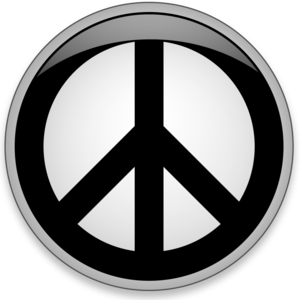| Peace button - Web 2.0 style (Photo credit: Wikipedia) |
As December came to an end, Pope Francis mentioned atheists during an address in which he called on us to work with religious believers to work for global peace. I noted at the time that global peace seems like a worthwhile goal, and I invited Francis to work with atheists to end clergy abuse, which strikes me as another worthwhile goal. It did not occur to me at the time to question what he might have meant by "peace."
When Pope Francis spoke of peace, did he mean what you and I usually think of when we think of peace, or did he mean something else? What else could he have meant? Rosa Rubicondior recently wrote about how peace is defined in the Christian bible and seems to mean something rather different there from how many of us think of it.
So the peace Matthew has Jesus talking about in the Beatitudes is the peace of total surrender and servility; the peace of accepting second class status in a conquered state; the peace of abject slavery and submission to a foreign master.No, I don't think that Pope Francis is hoping for the sort of peace Rosa describes as "something imposed and maintained" by military force. But I cannot help wondering if his version of peace might look quite a bit different from the absence of military conflict and the sort of neutrality inherent in secularism. I suspect, for example, that his view of peace just might include some form of Christian dominance.
In all those years of attending Protestant churches, I was taught that Jesus was a peacemaker. I always understood that to mean that he was about loving one's neighbor and putting an end to armed conflict. But Rosa's post reminds me that this was based on a fairly selective reading of the Christian bible (see Matthew 10:34-36), something liberal Christians are notorious for doing.
But then Jesus himself seems confused about whether peace is a good thing. He's in no doubt that his mission is not to bring peace to the Earth by cessation of all military activity and by turning swords into ploughshares, but to conquer it.This sort of peace appeared to involve submission to authority. It is the sort of peace that is attained after dissent is crushed and wills are broken. It is the sort of peace imposed through power.
Rosa notes:
So, when Christians quote Luke's angels and wish you 'peace on Earth and goodwill to all men', the peace they are wishing you is the peace of the slave who has surrendered freedom and even surrendered intellectual integrity in favour of faith and accepting their dogma without question. Significantly, these same people have never been slow to impose this 'peace' the same way the god of the Hebrews told them to impose it on others.Personally, I'm not willing to go that far. I am not going to assume that the Christian on the street who makes a vague culturally-sanctioned reference to peace this time of year means anything remotely like this. I'm not even going to assume that Pope Francis means anything like this. At the same time, I am willing to acknowledge that the peace of which some Christians speak may be an entirely different thing than what many of us think of by peace. Clearly, the sort of biblical peace of which Rosa reminds us is the last thing we should be working toward.
